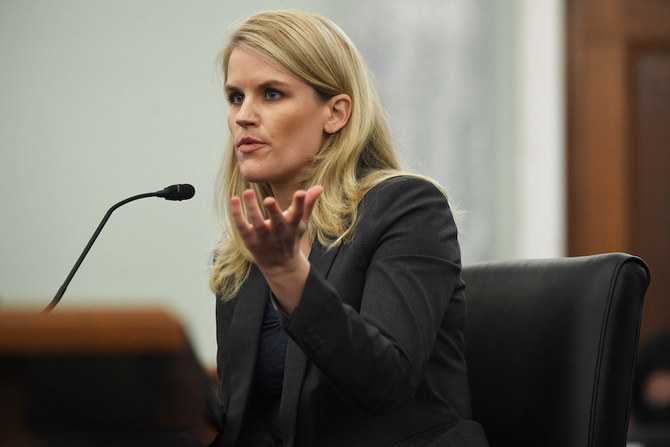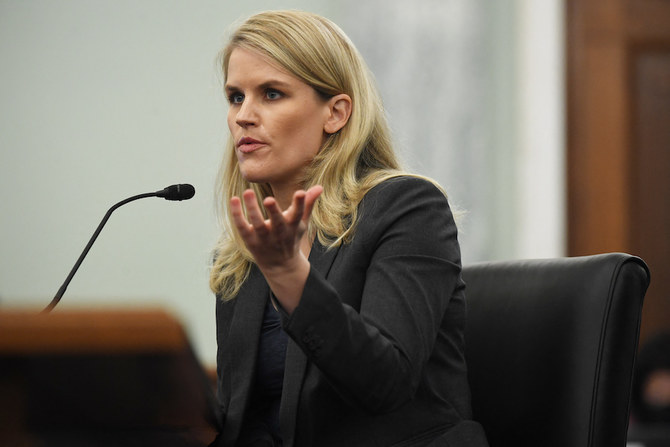WASHINGTON: A former Facebook data scientist told Congress on Tuesday that the social network giant’s products harm children and fuel polarization in the US while its executives refuse to change because they elevate profits over safety. And she laid responsibility with the company’s CEO Mark Zuckerberg.
Frances Haugen testified to the Senate Commerce Subcommittee on Consumer Protection. Speaking confidently at a charged hearing, she accused the company of being aware of apparent harm to some teens from Instagram and being dishonest in its public fight against hate and misinformation.
“Facebook’s products harm children, stoke division and weaken our democracy,” Haugen said. “The company’s leadership knows how to make Facebook and Instagram safer but won’t make the necessary changes because they have put their astronomical profits before people.”
“Congressional action is needed,” she said. “They won’t solve this crisis without your help.”
Haugen said the company has acknowledged publicly that integrity controls were crucially needed for its systems that stoke the engagement of users, but then it disabled some of those controls.
In dialogue with receptive senators of both parties, Haugen, who focused on algorithm products in her work at Facebook, explained the importance to the company of algorithms that govern what shows up on users’ news feeds. She said a 2018 change to the content flow contributed to more divisiveness and ill will in a network ostensibly created to bring people closer together.
Despite the enmity that the new algorithms were feeding, she said Facebook found that they helped keep people coming back — a pattern that helped the social media giant sell more of the digital ads that generate most of its revenue.
Senators agreed.
“It has profited off spreading misinformation and disinformation and sowing hate,” said Sen. Richard Blumenthal, D-Connecticut, the panel’s chairman. “Facebook’s answers to Facebook’s destructive impact always seems to be more Facebook, we need more Facebook — which means more pain, and more money for Facebook.”
Haugen said she believed Facebook didn’t set out to build a destructive platform. But “in the end, the buck stops with Mark,” she said referring to Zuckerberg, who controls more than 50 percent of Facebook’s voting shares. “There is no one currently holding Mark accountable but himself.”
Haugen said she believed that Zuckerberg was familiar with some of the internal research showing concerns for potential negative impacts of Instagram.
The government needs to step in with stricter oversight of the company, Haugen said.
Like fellow tech giants Google, Amazon and Apple, Facebook has enjoyed minimal regulation. A number of bipartisan legislative proposals for the tech industry address data privacy, protection of young people and anti-competitive conduct. But getting new laws through Congress is a heavy slog. The Federal Trade Commission has adopted a stricter stance recently toward Facebook and other companies.
The subcommittee is examining Facebook’s use of information from its own researchers on Instagram that could indicate potential harm for some of its young users, especially girls, while it publicly downplayed the negative impacts. For some of the teens devoted to Facebook’s popular photo-sharing platform, the peer pressure generated by the visually focused Instagram led to mental health and body-image problems, and in some cases, eating disorders and suicidal thoughts, the research leaked by Haugen showed.
One internal study cited 13.5 percent of teen girls saying Instagram makes thoughts of suicide worse and 17 percent of teen girls saying it makes eating disorders worse.
Because of the drive for user engagement, Haugen testified, “Facebook knows that they are leading young users to anorexia content. ... It’s just like cigarettes. Teenagers don’t have any self-regulation. We need to protect the kids.”
Haugen has come forward with a wide-ranging condemnation of Facebook, buttressed with tens of thousands of pages of internal research documents she secretly copied before leaving her job in the company’s civic integrity unit. She also has filed complaints with federal authorities alleging that Facebook’s own research shows that it amplifies hate, misinformation and political unrest, but the company hides what it knows.
“The company intentionally hides vital information from the public, from the US government and from governments around the world,” Haugen said. “The documents I have provided to Congress prove that Facebook has repeatedly misled the public about what its own research reveals about the safety of children, the efficacy of its artificial intelligence systems and its role in spreading divisive and extreme messages.”
The former employee challenging the social network giant with 2.8 billion users worldwide and nearly $1 trillion in market value is a 37-year-old data expert from Iowa with a degree in computer engineering and a master’s degree in business from Harvard. Prior to being recruited by Facebook in 2019, she worked for 15 years at tech companies including Google, Pinterest and Yelp.
After recent reports in The Wall Street Journal based on documents she leaked to the newspaper raised a public outcry, Haugen revealed her identity in a CBS “60 Minutes” interview aired Sunday night.
As the public relations debacle over the Instagram research grew last week, Facebook put on hold its work on a kids’ version of Instagram, which the company says is meant mainly for tweens aged 10 to 12.
Haugen said that Facebook prematurely turned off safeguards designed to thwart misinformation and incitement to violence after Joe Biden defeated Donald Trump last year, alleging that contributed to the deadly Jan. 6 assault on the US Capitol.
After the November election, Facebook dissolved the civic integrity unit where Haugen had been working. That, she says, was the moment she realized “I don’t trust that they’re willing to actually invest what needs to be invested to keep Facebook from being dangerous.”
Haugen says she told Facebook executives when they recruited her that she wanted to work in an area of the company that fights misinformation, because she had lost a friend to online conspiracy theories.
Facebook maintains that Haugen’s allegations are misleading and insists there is no evidence to support the premise that it is the primary cause of social polarization.
“Even with the most sophisticated technology, which I believe we deploy, even with the tens of thousands of people that we employ to try and maintain safety and integrity on our platform, we’re never going to be absolutely on top of this 100 percent of the time,” Nick Clegg, Facebook’s vice president of policy and public affairs, said Sunday on CNN’s “Reliable Sources.”
That’s because of the “instantaneous and spontaneous form of communication” on Facebook, Clegg said, adding, “I think we do more than any reasonable person can expect to.”
Facebook whistleblower says network profits as it hurts kids, fuels division
https://arab.news/me2qz
Facebook whistleblower says network profits as it hurts kids, fuels division

- Facebook’s leadership had rejected recommendations made to make its sites, which include Instagram, safer
- Frances Haugen, a former product manager on Facebook’s civic misinformation team, said Facebook had also done too little to prevent its platform from being used by people planning violence
Media ministry’s Konoz wins 6 gold awards

- “The Destination” showcases the developments witnessed in Saudi Arabia over the past few years across political, economic, medical, sports, cultural, media and artistic fields
RIYADH: The Konoz Saudi Arabia initiative, one of the Ministry of Media’s programs, achieved a global milestone by winning six gold awards at the AVA Digital Awards for its documentary film “The Destination.”
Awards were given for documentary, film, editing, informational, cinematography and directing.
With the achievement, the film’s total awards since its release have risen to 13, in addition to receiving three international commendations, bringing the initiative’s overall tally to more than 50 local and international awards.
“The Destination” showcases the developments witnessed in Saudi Arabia over the past few years across political, economic, medical, sports, cultural, media and artistic fields. The film highlights the steady and accelerated steps toward realizing Saudi Vision 2030 and the Kingdom’s transformation into a global destination.
The documentary is currently available on the Shahid and stc tv platforms, in addition to being screened onboard Saudia flights. It combines creative footage drawn from trusted media sources covering events across the Kingdom with exclusive interviews featuring experts and specialists in the fields addressed by the film.
To date, the documentary has surpassed 10 million views across various platforms.
The AVA Digital Awards are among the most prestigious international awards, established in the US nearly 19 years ago. The awards aim to honor excellence in planning, directing, design and production across digital campaigns, audio and video production, website development, and social-media marketing and engagement.














